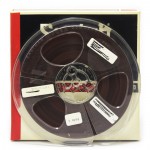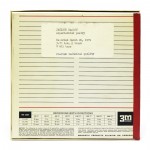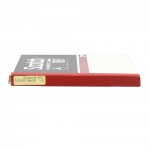Jackson Mac Low at SGWU, 1971, Part 1
Annotation
00:00:02.89
Wood flute is being played while Jackson Mac Low speaks.
Annotation
00:00:36.19
Jackson Mac Low reads "Last Buildings" starting with line "When firey water...?
Annotation
00:01:28.22
New performance starting with"...1954", "Sustenance... 52365 the first biblical poem...20 children..." [Many voices, flute, banging sounds all at the same time, mostly inaudible]
Jackson Mac Low
00:05:27.71
From Judges 6:4 to First Samuel 1:10, written Saturday, 1st January 1955.
Annotation
00:05:40.21
Reads "and the glorious burning of the stars and stripes and the sheet metal of Central New York..."
Jackson Mac Low
00:07:20.25
Next is a “Word event for George Brecht” on the words 'anti-personnel bombs', this is a kind of poem that can be done on any words, I did it first on these words at a reading in New York where the Russian poet Voznesensky joined some American poets in an anti-war reading.
Annotation
00:07:43.12
Reads “Word event for George Brecht”.
Jackson Mac Low
00:21:12.33
All the people who are going to read the "Number to Symmetries" please come up for the microphone...These were a group of a hundred poems, of the form that has holes in it, that is the format of the poems are used to indicate silences, where there's white space on the page, they're silences. Some of the phonemes on the ends of words are prolonged, and others are stuttered, I'm not sure that any of them that are stuttered are in this particular batch, I wrote about 500 of these in late 1961, early- late, let's see, late 60 and early 61. I wish you'd say your own names, because I didn't get all your names down in the book, be sure to write your names in my book when you leave. Would the people participating just tell their names to the audience because I don't know all of them?
Annotation
00:22:47.21
Readers read their names: Peter Boxer, [inaudible name], Walter Katjetski, Robert Graham, Jenny Burn, [inaudible name], Ivan Lourd?.
Jackson Mac Low
00:22:59.70
Remember when you get to the end of one, then the next person will take the mic.
Annotation
00:23:26.93
Sorting out mic and readers. [mostly inaudible.]
Annotation
00:25:23.68
Reading of "Number of Symmetries" performed by several people.
Jackson Mac Low
00:41:01.17
In 1960, just before I wrote this group, I wrote a group of poems called the...[CUT]
Annotation
00:41:13.73
END OF RECORDING
Jackson Mac Low
00:41:13.73
"Stanzas for Iris Lezak", they're-- this is the summer of 60, they're presently being published this year by the Something Else Press, which is nominally in New York and really in Newhall, California, at the center of the earthquake. I'll first read a short group, solo, and then read one in a duet with the-of the earlier performance of it. "Poem Psychoanalysis".
Annotation
00:42:30.70
Reads "Poem Psychoanalysis".
Annotation
00:42:57.96
Reads "Marseille".
Annotation
00:44:11.48
Reads "London".
Annotation
00:44:48.97
Reads "Sydney".
Annotation
00:44:58.97
Reads "Berlin".
Annotation
00:45:12.66
Reads "Madrid".
Annotation
00:45:21.87
Reads "Rome".
Annotation
00:45:59.87
CUT to flute playing or electronic sound, montage of sounds and words.
Jackson Mac Low
00:47:37.58
I'll explain a bit, I took these from whatever I was reading from about April to October of 1960, the group of place-name poems were from scatter paper called The National Enquirer. This is from the, an article, in the Scientific American ...
Annotation
00:48:06.43
Cut- reads Scientific American poems.
Jackson Mac Low
00:55:27.62
This is a, a number of these are collages of various times and places, as well as spontaneity in this room here, on two of these tapes, you will hear a lady's voice along with my own. I did a concert of my works along with Jim Tenney and Max Newhouse?, in town hall, New York in September of 1966, and still earlier Max Newhouse had realized this particular piece which is a piece produced by subjecting the electric typewriter keyboard to randomization by random numbers, so it looks like a lot of different characters from the electric typewriter, Newhouse recorded it at the University of Illinois laboratory, I guess some time earlier in 66 or maybe 65 and then put it down four octaves. He and another guy were reading from- the readers read from this in any way they wish, now I'll have the live readers to come up here...So then in... in this 66 concert, I did it as a duet, reading through the negatives from which this was printed, the blinking light, and a Gene(jean?) Lee, a very fine blues singer was in the various works that were performed in that concert, and she's on the duet that you hear, that you will hear. A year ago, or a little more, I guess in April of last year I performed this in a class at NYU along with the- oh and the Newhouse tape was along with that performance in NYU, then the town hall performance and the Newhouse tape- all three were in the NYU performance along with the NYU performance, so now you'll hear it at least four different times, plus the present, something like that.
Annotation
00:58:23.09
Performs recordings. [Random numbers and letters.]
Jackson Mac Low
01:06:11.48
I'll do a piece called "Fifth Gata" which is another group piece, uh, the readers who learned it, please come up with copies, and I'll have to toss around tapes for a few minutes here. I might explain that this particular piece is one of a series I call "Gatas" that are written on graphed paper, they by chance operations, I take the mantra of one religion or another, this happens to be the great prajna paramata mantrum?, which is basic to Northern buddhism and zen buddhism, and it's arranged by the method so that it falls over an axis of 'a's, 'u's and 'm's that is the word 'aum', wherever a's, u's and m's appear in the mantra they may cross the mantra, there aren't many u's in this particular one, so there isn't any- nothing crossing the u-line, you may be able to see the empty gap there. The mantra in question is "Gone, gone to the other shore, quite gone over the other shore, boldly, wisdom, spaha, pray. Guthe, guthe, paraguthe [inaudible.].." you may, those of you who know zen may be more familiar with it in it's Japanese version, which is sort of a Japanixzation of the Sanskrit. The group version of it was done in the Chelsea Hotel, I think in '67, but the German editor and producer, Karl Weisner, the crisper version you hear, I did at home, earlier, maybe in 66, 65, 66.
Annotation
01:09:35.72
Performs "Fifth Gata".
Jackson Mac Low
01:26:20.17
The last poem is by [inaudible] was also from Stanzas for Iris Lezak it's based on the Tibetan prayer to the gurus and it's translated by W.Y. Evan-Wentz. The next piece is "All by Bluebirds"[?.] [Inaudible.]..in recent years I've gone back to writing poems in the form of the asymmetries that I wrote in 60 and 61 but these tended to cluster around one subject matter, there's one in the current Aspen Magazine about young turtles, no one really knows where they go once they've hatched, and they know when they come back, but they don't really know what they do in between hatching and there is a natural history magazine, there was a caption to a picture, and so there was a record in the current Aspen that's of that group. This is the first one of this type that I do on bluebirds, was for a group event that a number of us [inaudible word], Iris Lezak, Emmet Williams, Carl Bouget [?] and Jet Yalka [?] and I did a collective event for the University of Syracuse at Utica, which we called, which Emmet named for us "Jack-a-Jurismatics"[?] and so one of the pieces I wrote for that was this bluebirds piece, Emmet Williams has a beautiful work that has bluebirds in it, it's a permutation? poem that also appears in this anthology, although this is an anthology that Le Monte Young got together in 60 and- well, 60 and 61 I guess, and he had many difficulties between the time that it was designed and the time it was printed and finally got it out at first in 1963, it's called Anthology of well, various things, chance operations, and well I don't know what, concept art, anti-art, indeterminacy improvisation, meaningless work, natural disasters and so on. And well, just recently, our first edition is now a sort of a collector's item, sells around a hundred, but recently a German publisher re-published it for us and the current, the new editions is going for $8.50, so if anyone is- I don't have copies here but I'll be happy to send any to anybody. Contains work mostly, a lot of it is musical scores, there's some other poetry, including the Emmet Williams mention. The Emmet Williams poem does all the variations, does all the permutations of one group of things, "somewhere bluebirds are flying high in the sky, in the cellar even blackbirds are extinct" each of those is considered a run unit, and all the possible permutations of them are written out "somewhere bluebirds are flying high in the sky, in the cellar even blackbirds are extinct" I'd love to read it, but it's very long. Usually we read it with five different voices, each taking the unit and once in a while, people get through it without breaking down laughing. [inaudible (speaking] This was taken from, the bluebird [inaudible word] were from two... encyclopedia articles on bluebirds, one I think the Audubon Encyclopedia, and I've forgotten what the other one was. They're very complimentary. The voices you hear, are you heard in another performance of Lesley Sixfan[?], Amy Spurling and Harvey Lesain[?], along with four of my students at the Mana? School of Music and about done in 1966, or 1967, I think it was May of 1967 that this was done. There's a specially gifted group I felt that I happened to get together in that class, just towards the end we were doing mostly we were just doing ordinary grammar English, I'm an English teacher, for my bread.
Annotation
01:32:11.84
END OF RECORDING.




